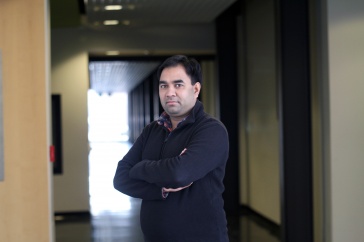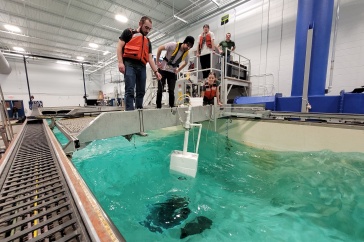Three years ago, Saudi Aramco experienced one of the worst data breaches in its history when more than 30,000 of its computers were wiped clean. In May 2014, hackers stole the addresses, Social Security numbers, birthdates and passwords of 233 million eBay users. And in September 2015, a credit agency that serves T-Mobile was hacked, putting the personal information of as many as 15 million customers at risk.

“Every year the attacks are bigger, more often,” says Keith Hoodlet ’17, a computer science major and vice president of UNH's cybersecurity club. “Look at how many more phones, appliances, devices are connected to the Internet that weren’t five years ago. Of course we’re more vulnerable.”
One of the fastest growing fields in the tech sector — the Bureau of Labor Statistics predicts a 37 percent increase in security analyst positions alone by 2022 — cybersecurity is what brought Hoodlet, who has a bachelor’s degree in psychology, to UNH.
In November, UNH was one of 10 universities from around the country to make it to the final round of the 2015 National Cyber Analyst Challenge in Washington, D.C. Sponsored by Lockheed Martin and Temple University, the three-phase competition was designed to test and improve students’ skills in thwarting cyberattacks.
During the qualifying round, teams analyzed more than 75 gigabytes of data to find the root and extent of a data breach at a fictitious company and then offer solutions to solve the problem and prevent future hacks. The second phase involved a daylong training session, while the finals presented a staged real-time cyberattack challenge.
“Cybersecurity is important for companies in the same way that armed guards are important for banks,” says Hoodlet. “Likewise, cybersecurity is every bit as important for the individual who uses an Internet-connected device to file taxes, purchase goods or perform banking.
“As a society, we trust that the software and hardware we use to perform these tasks is secure enough so that we do not succumb to financial fraud or other risks. The more complex a system or application is, the more vulnerable it is to exploitation.”
Cybersecurity professionals work to find and remediate those vulnerabilities before criminals can use them to commit acts of fraud or other harmful activities, Hoodlet says. Competitions like Lockheed Martin’s and the annual Northeast Collegiate Cyber Defense Competition that UNH hosted in 2014 help students build their skills before going on to the real world.
“These competitions are important because they teach us that we are completely reliant on technology. We go to stores and buy phones and laptops or pay for Internet services, but we never stop to think about how much of ourselves we tell the world,” says Adam Wong, a cybersecurity club member who captained the social engineering team at a recent competition.
“The Internet is fantastic, but we have to stop and think about the real dangers of having everything connected to the Internet and how to handle high-level emergencies like data breaches. We are learning best practices in securing networks and personal data from ending up in the hands of the bad guys.”
Former club member Chris Neveu ’12, now its assistant coach and a security analyst for Liberty Mutual, agrees.
“The club is a great opportunity to learn skills that are in great demand in the job market today,” Neveu says. “I got my current job from the work I’ve done with the club. All of our competitive events are sponsored by companies looking for cybersecurity hires, so they aggressively recruit from the top schools.”
And it’s going to take top minds to keep up with the hackers, Hoodlet says.
“The exploits they’ve discovered are really out of this world,” he says, drawing an analogy between predatory animals and their kill. “Those animals evolved faster because they had to outwit their prey. Having that kind of imaginative mindset is where new attacks come from.”
UNH hosted the Northeast Collegiate Cyber Defense Competition in 2014. Video
-
Written By:
Jody Record ’95 | Communications and Public Affairs | jody.record@unh.edu



















































